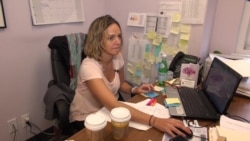The huge number of cases of undocumented children who entered the U.S. illegally is straining immigration courts around the country, especially in Miami, Florida, which has 13,000 cases pending.
In July, the Obama administration ordered that children’s cases be pushed through first, before those of undocumented adults. Miami immigration attorneys call this the "rocket docket."
“It’s an overwhelming number of kids that need representation,” said Attorney Elizabeth Sanchez Kennedy, who represents children in Miami’s immigration court through Catholic Legal Services. “I don’t know if the process or if the number of kids is going to slow down.“
When undocumented children are caught at the border, they are detained in shelters. Then they are sent to live with relatives in the U.S. until their court cases are heard. A judge decides if they should stay in the United States or be returned back to their home country.
Florida received 4,000 undocumented minors this year -- the largest number, behind only Texas, New York and California.
The Miami courthouse is in a quiet cul de sac along the water. But that's where the calm ends. Children, some holding an advocate's hand, are scared as they walk along the sidewalks to court. Most do no know the language and have not been inside a courtroom before.
“I was nervous. I didn’t know what they were going to ask me,” said 15-year-old Roxanna in Spanish. She told how she crossed through Texas from Honduras and then was sent to Florida to stay with her mother and father -- already living in the U.S.
Inside, the courtroom is primitive. Two long wooden tables flank a raised platform at the front of the room where the judge's desk is. In plain wooden chairs, the children sit at the table on the left, with a lawyer if they have one. The government attorney sits at the table on the right. About 20 spectators can attend and are separated from the front of the room by a low wooden barrier with a swinging gate. The first hearing lasts only a couple of minutes.
Advocates like Americans for Immigrant Justice [AI Justice] train lawyers to defend their young clients. AI Justice holds educational sessions on the trauma the children may have faced during their travel to the United States and still face with the knowledge of their uncertain futures.
“Our concern is that children who don’t have a reputable attorney to help them with their case, that they’re going to fall through the cracks and that in many instances they could be returned to, you know, terrible abuse or death.” said AI Justice Director Cheryl Little.
That's what frightens 17-year-old Wilmer Fernando Lorenzo. He escaped the Honduran gangs with his three younger brothers. He now feels misled. "Everyone said you could stay if you came here to study, but now I'm surprised that it was all lies, because it's really the judge that decides."
Some immigration opponents say the Obama administration is misinterpreting a law that children from Central America cannot be deported without a hearing.
David Caulkett with Floridians for Immigration Enforcement said that law was intended to stop child trafficking and should not apply to migrant minors.
“Our laws are not being enforced. The fact that they are getting over is just more incentive for more to come across,” said Caulkett.
No changes are expected soon, however, since the U.S. government has delayed action on immigration reform until after November's mid-term elections.





